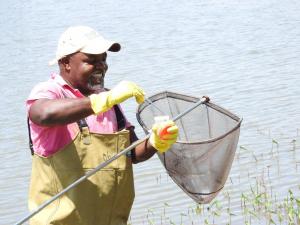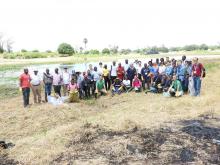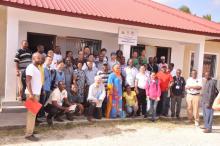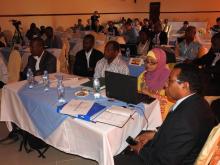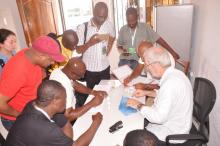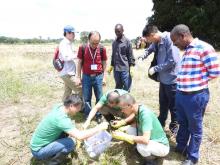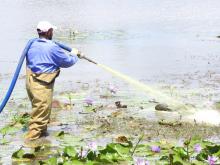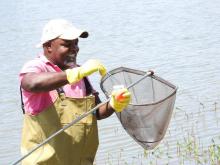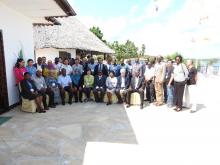WHO convenes experts to enhance capacity for schistosomiasis control across the sub-Sahara Region
Zanzibar, 12-16 September 2017: Schistosomiasis also known as Bilharzia is an acute and chronic disease caused by parasitic worms. Transmission occurs when people suffering from schistosomiasis contaminate freshwater sources with their excreta containing parasite eggs, which hatch in water. The larval forms of the parasite – released by freshwater snails – penetrate the skin during contact with infested water. In the body, the larvae develop into adult worms that can cause progressive damage to organs.
Lack of hygiene and certain recreational activities of school-aged children such as swimming or fishing in infested water make them especially vulnerable to infection. People can also get infected during routine agricultural, domestic, occupational, and recreational activities, which expose them to infested water.
Schistosomiasis affects around 260 million people worldwide with more than 90% of cases living in Africa. Estimates show that at least 218 million people required preventive treatment for schistosomiasis in 2015. More than 66.5 million people were reported to have been treated for schistosomiasis in 2015. Schistosomiasis control focuses on reducing disease through periodic, large-scale population treatment with praziquantel. Other key components are availability of safe potable water, adequate sanitation and snail control.
Snail control is done through environmental modification and use of compounds to kill snails (mollusciciding). Since little local capacity exists in most of the endemic countries on the use of molluscicides, and considering that their use will increase in the context of schistosomiasis elimination, WHO and partners have organized a training of country programmes and experts who are going to support programmes to implement snail control interventions. This is the second Malacology and Snail Control training being organized within the WHO China-Africa collaboration in schistosomiasis control.
The training workshop was officiated by the Regional Commissioner for South of Pemba, Madam Mwajuma Majid on behalf of the Revolutionary Government of Zanzibar and the Minister of Health Zanzibar, Honorable Mahamoud Thabit Kombo. In her opening remarks, she thanked WHO, the People’s Republic (PR) of China and other partners for choosing Pemba for this important workshop. She congratulated WHO and PR of China for initiating snail control interventions to compliment Mass Medicine Administration in the islets, and the whole of Africa. She also acknowledged the team for progress in snail control so far made in Pemba thus recommending the area to be a learning ground for other countries. She cited that both islands have managed to reduce prevalence of the disease to below 2% from above 65% back in 1981.She used this success to urge Zanzibaris to continue with the fight, and especially by addressing the on-going transmissions still being reported in reported hot spots. She urged all participants to take this training quite seriously and ensure implementation when back in their countries. She concluded her remarks by reassuring RGOZ’s continued commitment in the fight against schistosomiasis.
The Representative of the People’s Republic of China, Professor Zhang Yi, took the floor to give remarks on behalf of the Chinese experts and thank the Revolutionary Government of Zanzibar for agreeing to work with China in the elimination of Schistosomiasis in Zanzibar. She stressed the interest of the People’s Republic of China in working with African counterparts to mirror the success of schistosomiasis control achieved in China. She also commended the leadership role of WHO.
Dr. Amadou Garba, from WHO Headquarters, gave reasons for snail control and its interest in the elimination of schistosomiasis. He elaborated on the new WHO guidance on the field use of molluscicides in schistosomiasis control programmes and emphasized that the operational manual is intended to support programme managers reintroduce practices and protocols for use of molluscicides in the field.
On behalf of Dr. Matthieu Kamwa, WR Tanzania, Dr. Alphoncina Nanai welcomed all participants and shared the journey endured by all parties from the start of this collaboration in 2012 in Zanzibar to this training. On behalf of the WR, she thanked the RGOZ and People Republic of China for the joint effort to support control and elimination of schistosomiasis in Tanzania.
Over fifty (50) participants including national programme officers, experts and facilitators from institutions within and outside Africa and China, partners and WHO staff are attending the training course. The countries are Ethiopia, Ghana, Mozambique, Tanzania, Uganda and Zimbabwe.
By the end of the 5-days course, participants will have gone through snail survey, surveillance, laboratory diagnosis of schistosoma infected snails, and field application of molluscicides. They will come up with National Plans for Snail Control based on the new WHO manuals on molluscicides and its application in the field. Experiences of snail control in China will be used to support countries develop evidence-based interventions.
WHO’s work on schistosomiasis is part of an integrated approach to the control of Neglected Tropical Diseases (NTDs). Snail control is in line with the global vector control response 2017-2030 recently adopted by the World Health Assembly. Under the Sustainable Development Goal (SDG) 3, ‘Ensure healthy lives and promote wellbeing for all’, target 3.3 aims to ‘end the epidemic’ of neglected tropical diseases (NTDs) by 2030. Through the Expanded Special Project for Elimination of Neglected Tropical Diseases (ESPEN), WHO contributes to national and regional efforts to control and eliminate Neglected Tropical Diseases.




